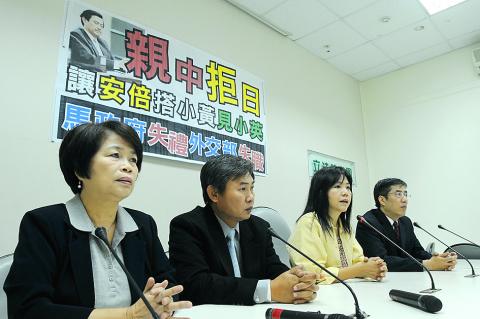|
DPP accuses Ma administration of
snubbing Abe
By Vincent Y. Chao / Staff Reporter

Democratic Progressive Party (DPP) legislators
accuse President Ma Ying-jeou in Taipei yesterday of breaches of protocol
regarding Monday’s meeting between DPP Chairperson Tsai Ing-wen and former
Japanese prime minister Shinzo Abe.
PHOTO: WANG YI-SUNG, TAIPEI TIMES
In what the Democratic Progressive Party (DPP) is portraying as a breach of
diplomatic protocol, former Japanese prime minister Shinzo Abe on Sunday night
was allegedly forced to hail a taxi from his hotel after Taiwanese foreign
affairs officials accompanying him supposedly failed to provide transportation.
According to an account from the DPP, halfway through a dinner party organized
by several DPP officials on Yijiang Street in Taipei on Sunday, Abe was escorted
back by Ministry of Foreign Affairs officials to the Ambassador Hotel, where he
was staying, for a press conference with Japanese media. At about 10:30pm, when
the press conference wrapped up, Abe sought to return to the restaurant. By that
time, however, the DPP and witnesses at the restaurant claim that Abe, a
bodyguard and a member of the Japanese Diet accompanying him, had to hail a cab
from the hotel’s main entrance, as the transportation provided by the ministry
had vanished.
“We couldn’t believe [Abe] was left without a car,” said Hsiao Bi-khim (蕭美琴),
director of International Affairs for the DPP and one of the attendees at the
dinner party. “If we had known he planned to come back this way, we would have
sent a car as a matter of courtesy.”
Abe’s dinner hosts did not know he had to take a cab until after a Japanese
representative casually mentioned that the former prime minister had hailed a
cab to return to the restaurant, DPP officials told the Taipei Times.
Witnesses at the scene included DPP legislators Chiu Yi-ying (邱議瑩) and Chen Ying
(陳瑩), who yesterday accused the ministry of -“impoliteness and incompetence.”
This was an embarrassing incident, they said, adding that this explained why
government officials were seeking to downplay the episode.
“The Ministry of Foreign Affairs just didn’t care about them,” Chiu said,
referring to Abe and his entourage. “During this trip, the government showed
that not only was it capable of ignoring common etiquette and courtesy, but also
Abe’s security.”
Hsiao claims Abe was similarly left without a diplomatic courtesy car after the
dinner party concluded and had to be driven back to the Ambassador Hotel by DPP
Secretary-General Wu Nai-jen’s (吳乃仁) driver in his private sedan.
Hsiao, who said she was in the car along with one of Abe’s bodyguards during the
trip back to the hotel, said Abe was “very polite” throughout the incident and
did not once mention it.
The version of events provided by the DPP could not be independently confirmed,
and calls to Abe’s office were not returned by press time, while the Japanese
Interchange Foundation, Japan’s de facto embassy in Taiwan in the absence of
official diplomatic ties, would not comment.
The ministry, which organized Abe’s itinerary, denies this version of the story
and maintains that a medium-sized van was provided at all times during Abe’s
two-day visit.
Abe was initially provided two courtesy cars, a medium-sized van as well as a
police escort, but ministry officials claim he waved those away on Sunday night
and insisted he only needed the van for his personal visits with DPP
politicians.
Ministry of Foreign Affairs Spokesman James Chang (章計平) said that at no point
during his visit did Abe find himself without transportation, adding that the
ministry had no information about his being forced to travel by taxi on Sunday.
Chang said the driver of a medium-sized bus arranged by the ministry left the
Ambassador Hotel at about 11pm after Japanese officials said Abe no longer
needed it.
“Given that our guest did not request us to arrange a meeting with [the DPP]
before and after he arrived [in Taiwan], we had no information about his
personal activities and knew nothing about the taxi,” he said.
Chang said Abe was transferred from a limousine provided by the ministry to the
van at about 9pm on Sunday after a banquet hosted by President Ma Ying-jeou
(馬英九) at the Presidential Office.
Former government leaders on visits to Taiwan are routinely afforded the same
level of security used for visiting heads of state. During former US president
Bill Clinton’s visit to Taiwan in February 2005, his motorcade was protected by
police and trailed by US and Taiwanese bodyguards.
Compounding the issue, DPP lawmakers said the treatment afforded Abe, who was
prime minister between 2006 and 2007, contrasted sharply with that of Chinese
envoy Chen Yunlin (陳雲林) in December.
Chen and his wife, both staying at the landmark Grand Hotel, were escorted in a
motorcade, including a black limousine and half a dozen police cars during his
five-day visit. Thousands of police officers were mobilized for the
controversial visit.
DPP lawmakers also claim that the ministry failed to provide transportation for
the 10-plus members of the Diet who were also attending the dinner party on
Sunday.
|
![]()
![]()
![]()